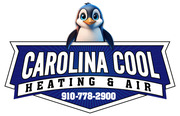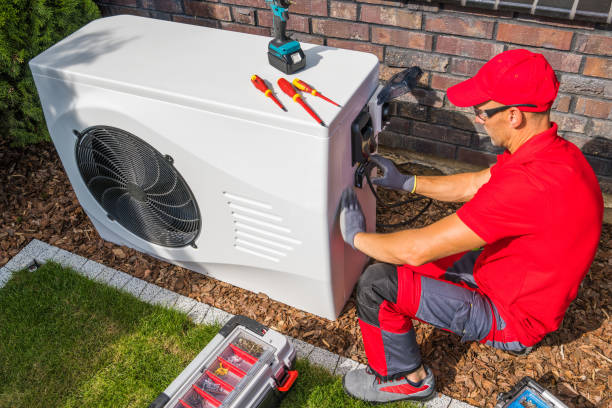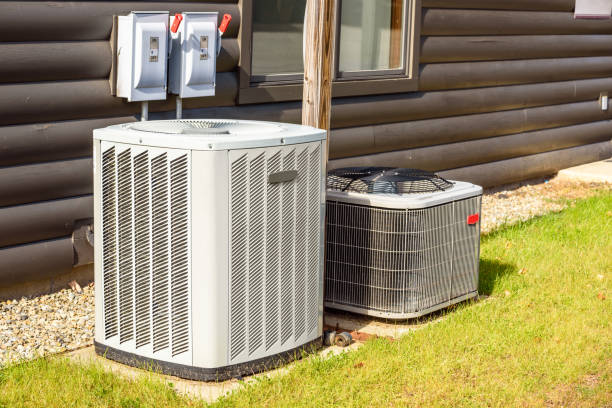When the weather changes in North Carolina, your heat pump becomes one of the most important systems in your home. It keeps you warm during chilly winters and cool in the hot summer months. But what happens when your heat pump won’t turn on at all? It can be frustrating and stressful, especially when you need it most.
At Carolina Cool Heating & Air, we know how important it is to have heating and cooling in North Carolina. That’s why we’ve created this troubleshooting guide to help you figure out why your heat pump isn’t working and what you can do about it.
Table of Contents
Toggle1. Check the Thermostat
The thermostat is the control center for your heat pump. If it’s not working correctly, your system won’t turn on. Here are a few things to look at:
- Make sure the thermostat is on: Sometimes the thermostat can be accidentally switched off or set to the wrong mode.
- Check the temperature setting: If your thermostat is set too close to the current room temperature, the heat pump may not kick on. Try adjusting it a few degrees higher (for heat) or lower (for cooling).
- Replace batteries if needed: If your thermostat uses batteries, weak or dead batteries can prevent it from sending signals to your heat pump.
2. Inspect the Power Supply
Your heat pump needs power to run. If there’s an electricity issue, your system won’t start.
- Check your circuit breaker: Look at the breaker panel in your home. If the breaker for your heat pump has tripped, reset it by switching it off and then back on.
- Examine the disconnect switch: Heat pumps usually have a disconnect switch outside near the unit. Make sure it’s set to “on.”
- Check for blown fuses: Some systems use fuses that can blow out. Replace them if necessary.
If your home in North Carolina has had recent power outages or surges, this could also affect your system.
3. Inspect the Outdoor Unit
Since the heat pump’s outdoor unit sits outside your home, it can be affected by weather, debris, or other problems.
- Clear away debris: Leaves, dirt, or branches can block airflow. Clear the area around the unit.
- Check for ice buildup: In winter, heat pumps can freeze up. If the unit is covered in ice, turn it off and let it thaw before turning it back on.
- Look for visible damage: Dents, broken fan blades, or disconnected wires may stop the system from working.
If you notice damage to the outdoor unit, it’s best to call a professional technician from Carolina Cool Heating & Air for repairs.
4. Check the Safety Switches
Heat pumps often have safety switches that shut down the system when there’s a problem.
- Some systems include a float switch that stops the heat pump if water builds up in the drain pan.
- If you see standing water near the indoor unit, that could be the issue.
In this case, you’ll need professional help to clear the drain line and reset the system.
 5. Inspect the Capacitor and Starter Components
5. Inspect the Capacitor and Starter Components
If your heat pump hums but doesn’t start, the problem may be with the capacitor or starter components. These parts help your heat pump motor turn on.
Because they deal with electricity, it’s not safe for most homeowners to repair or replace these themselves. If you suspect this issue, contact Carolina Cool Heating & Air in North Carolina to have a licensed technician check it for you.
Look for Signs of a Bigger Problem
Sometimes the issue is more serious and requires professional repair. Signs of a larger issue include:
- Unusual noises like grinding, buzzing, or rattling
- A burning smell when you try to turn on the system
- The unit turns on briefly and then shuts down again
- No air blowing through your vents, even though the system is on
These symptoms point to electrical problems, failing parts, or refrigerant issues that need expert service.
Tips to Prevent Future Heat Pump Problems
While some breakdowns can’t be avoided, regular care goes a long way toward keeping your heat pump working. Here are some maintenance tips:
- Change filters regularly: Clean filters keep air moving and prevent stress on the system.
- Schedule yearly maintenance: A technician can catch small problems before they turn into big repairs.
- Keep the outdoor unit clear: Trim back plants, bushes, and debris at least two feet around the unit.
- Check thermostat settings seasonally: Adjust your thermostat as the weather changes in North Carolina.
- Watch for signs of trouble early: Strange noises, uneven temperatures, or higher energy bills are signs that your heat pump may need attention.
By taking these steps, you can keep your heat pump running smoothly and avoid unexpected breakdowns.
Final Thoughts
A heat pump that won’t turn on can be frustrating, especially when you need heating or cooling right away. By checking the thermostat, power supply, air filter, outdoor unit, and safety switches, you may be able to solve the problem yourself. But if the issue is more complicated, professional help is the best option.
For heat pump repair in North Carolina, contact Carolina Cool Heating & Air. Our friendly team will restore your comfort quickly and make sure your system is ready to handle whatever the weather brings.
Frequently Asked Questions
Why is my heat pump not turning on?
A heat pump may not turn on due to thermostat issues, tripped breakers, dirty filters, or outdoor unit problems. In some cases, professional repair is needed.
How do I know if my heat pump thermostat is broken?
If your heat pump doesn’t respond to temperature changes, the thermostat screen is blank, or it doesn’t switch modes, the thermostat may be faulty.
Can power surges damage a heat pump in North Carolina?
Yes, power surges can damage electrical components in your heat pump. Always check the breaker panel after an outage and call a technician if the system doesn’t restart.
How often should I replace my heat pump air filter?
Replace your air filter every 1–3 months to prevent clogs that can shut down your system.
Who provides heat pump repair near me in North Carolina?
Carolina Cool Heating & Air offers professional heat pump repair, maintenance, and installation services throughout North Carolina.
What is the most common problem with heat pumps?
Common issues include thermostat malfunctions, clogged filters, frozen outdoor units, and electrical failures.
How do I know if my heat pump needs repair or replacement?
If your heat pump is over 10–15 years old, breaks down often, or has high energy bills, replacement may be a better option than repair.




 5. Inspect the Capacitor and Starter Components
5. Inspect the Capacitor and Starter Components